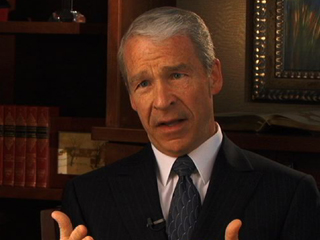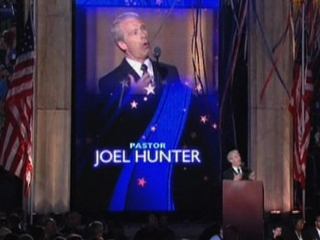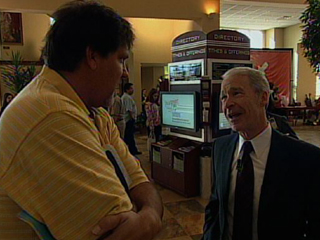In This Episode << SLIDE LEFT TO SEE ADDITIONAL SEGMENTS
Joel Hunter
KIM LAWTON, anchor: One of President Obama’s early moves when he took office six months ago was to establish an unprecedented new council of religious and secular leaders to advise him on faith-related social policy. Evangelical megachurch pastor Joel Hunter from Florida is part of that council. Hunter is becoming an increasingly influential leader for those he calls “a new kind of conservative.” I visited him at his church near Orlando.
KIM LAWTON: It’s Sunday morning and people are heading to church. One might expect them to be bringing along a Bible; maybe their tithes and offerings. But at Northland Church, just outside Orlando, they’re also bringing obsolete computers and printers, old stereos and other hard-to-recycle items. The evangelical megachurch has made a commitment to the environment — what members here call “creation care.” It’s part of a wide-ranging social agenda championed by Northland senior pastor Joel Hunter. He says that agenda signals a maturing of the evangelical movement.
Reverend JOEL HUNTER (Senior Pastor, Northland Church, Florida): We like to call it “growing up.” I think especially in the political realm we went through a phase more recently when we were known for what we were against rather than what we were for. We were pretty narrow in what we were paying attention to rather than very broad. Now that wasn’t true in Jesus’ time, because Jesus was very broad in what he did.
LAWTON: Like most evangelicals, Hunter opposes abortion and gay marriage. But his agenda also includes the environment and issues of poverty, torture, peace and interfaith dialogue. Hunter does describe himself as a pro-life registered Republican. Yet his views captured the attention of President Barack Obama. Hunter was part of a group of religious leaders who prayed privately with Obama during the campaign, and he’s now a member of Obama’s advisory council on faith-based and neighborhood partnerships.
Hunter believes evangelicals have a spiritual obligation to have a positive influence wherever God places them, even if that may be among Democrats.
Rev. HUNTER: I hope that along the way I could be of encouragement in the president’s spiritual life because that’s what a pastor does, that’s what we care about. But beyond that, I’m very excited about working with a very broad spectrum of people to see how our faith communities can really solve the problems, or help solve the problems, of this country.
LAWTON: Despite his national responsibilities, Hunter makes it clear that his base of operations is Northland. The nondenominational church was started by 11 people in 1972. Hunter, who was a United Methodist pastor, came here in 1985. Today, about 12,000 people attend the church every week. Northland calls itself “a Church Distributed.”
Rev. HUNTER: We emphasize what goes on outside the building rather than what goes on inside the building, and we want to equip people for living great lives where they are.
LAWTON: The Internet helps with that distribution. Thousands of people around the world participate in the worship services through an innovative online Web cast.
Rev. HUNTER: So when we built this building, we built it as a communications device, and the selling point to the congregation was look, you’re not building a building that can just seat 3,000 people at a time. We can seat three million people at a time if we have enough broadband and we have enough people who can gather around a computer screen.
(speaking to audience): And for those of you who are worshipping with us online . . .
UNIDENTIFIED MAN #1: Let’s hear from a couple of folks who worship with us online.
Rev. HUNTER: Somebody texted in from the last service . . .
LAWTON: Some people watch individually, others gather in small groups in people’s homes, fast-food restaurants, even a prison. Northland knows of alternative worship sites as far away as Argentina, Egypt and Ukraine. As the church grew, so did Hunter’s vision of having an impact on the wider culture. In July of 2006, he was chosen to be the new president of the Christian Coalition of America, the political advocacy group founded by Pat Robertson. But Hunter withdrew even before he took office when it became clear that coalition members were uncomfortable with his broad issue agenda.
LAWTON: Mark Pinsky is a veteran religion writer in Orlando who has covered Hunter for 14 years.
MARK PINSKY (Religion Writer): Even though he didn’t take that job, eventually he was forced out, he really won, because the issues on which he lost his job were the right issues as far as the coming evangelical movement is concerned.
LAWTON: In many ways, Hunter has become a national voice for evangelicals seeking a new style of leadership.
Rev. HUNTER: There is a whole new generation of young evangelicals that are coming up that really don’t care about any of the labels. I mean, they could care less — Democrat, Republican, liberal, conservative — they don’t care. What they care about is can we change the world for the better?
LAWTON: But Hunter still gets push-back from evangelical traditionalists.
Mr. PINSKY: He believes in making coalitions on an issue-by-issue basis, and that puts them together with, sometimes, with people who support abortion rights, for example. But there are people in the evangelical movement both in his congregation and nationally who won’t do that, who won’t sit down at the table with people they don’t agree with on other issues.
LAWTON: Hunter has also made some evangelicals uncomfortable by building coalitions with people from other faiths. He’s part of a project to improve dialogue between Islam and the West, and he advocates building strong personal relationships with people from other religions.
Rev. HUNTER: The better relationship you build, the more free you are to share with people what you really believe, and then you let God take care of the rest. It’s not my job to convert people, you know? Only God can move in the spirit to change somebody’s heart or to establish a relationship.
LAWTON: Hunter raised a lot of eyebrows when he tried to show interfaith respect at the 2008 Democratic National Convention. He was chosen to give the closing prayer after Obama’s acceptance speech. When he got to the end, he stopped and gave the crowd some instructions.
Rev. HUNTER (at DNC): On the count of three, I want all of you to end this prayer, your prayer, the way you usually end prayer.
To make somebody or to cow somebody into silence as you pray in Jesus’ name, or to somehow make them seem like they’re praying in Jesus’ name is really a sacrilege, because only Christians can pray in Jesus’ name.
(at DNC): One-two-three: In Jesus’ name, Amen. Let’s go change the world for good.
LAWTON: He got some strong reactions afterward.
Rev. HUNTER: On the one side, I had a wonderful encouragement especially from non-Christians, you know, and from many Christians who understood what I was doing. I got raked over the coals with a lot of Christians because I didn’t hijack the prayer and pray it only for Christians.
LAWTON: There are those who worry that Hunter’s relationship with Obama, and his position on the advisory council, could hinder the pastor’s ability to speak truth to power.
Rev. HUNTER: The president has made it very clear — and this is another thing I like about him — is he is not looking for “yes” people here. He’s looking for people on this council that will have a prophetic voice, and all of us made the agreement that we would not be on the council unless we could be blunt-honest.
LAWTON: Hunter acknowledges it can be a heady thing to be inside the Oval Office, and he knows power can be seductive. He tries to keep it in perspective.
Rev. HUNTER: The idea here that goes through my mind is that this is not the person that I’m going to be answering to. That’s a way higher thing, and on judgment day when I stand before God, I’m going to have to answer to what I’ve said.
LAWTON: Hunter says his family and his church life keep him grounded. He says he doesn’t seek the limelight. In fact, he really doesn’t like it at all.
Rev. HUNTER: I have no desire for people to really know who I am. I’m an — you wouldn’t believe this — but I’m an introvert. You know, I could spend all day in a library and just be perfectly content as long as my wife was one stack over.
Mr. PINSKY: No one is perfect, and he’s not perfect. He’s a man of some ambition, I think he will admit to that. But he lives his faith, he has a good family life, at least that which we can see. He doesn’t live extravagantly. He’s relatively modest in the way he lives his life, and with him I really believe what you see is what you get.
UNIDENTIFIED MAN #2 (speaking to Rev. Hunter): I’ve probably trusted God more than I ever have.
Rev. HUNTER: That’s so great. That is so great.
LAWTON: For Hunter, it all comes down to a simple calculus.
Rev. HUNTER: I think what I do is not so different than anybody else except maybe in different circles, but I just live my life as best I can, and I just pray that I’ll do God some good.
LAWTON: I’m Kim Lawton in Orlando.





